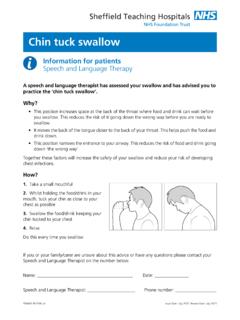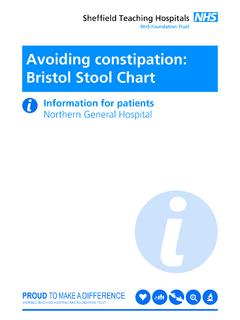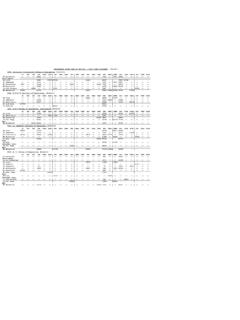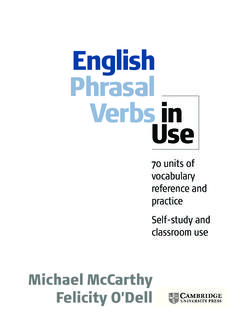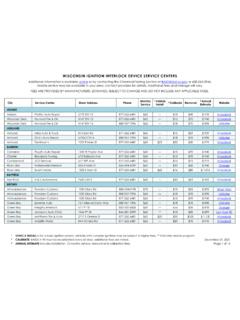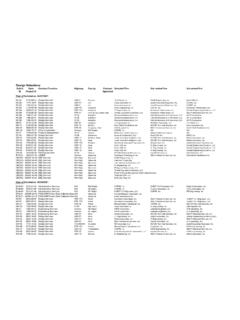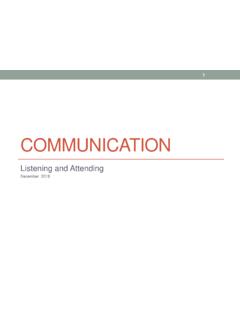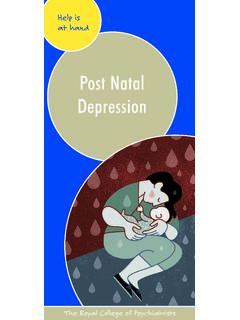Transcription of Help for children who are extremely fussy eaters
1 Help for children who are extremely fussy eatersInformation for parents Sheffield Community Dietetics Service Contents1: Introduction 1 How to use this information sheet Introduction to fussy eating Comparing common and extreme fussy eating When to get more help 42: Strategies to help you First line help 5A: Establish an eating routine 5B: Limit drinks 5C: Foster a healthy attitude towards eating 6D: You decide what to offer 6E: Persevere 7 What will you work on first? Extra strategies for extremely fussy eaters 10A: Establish an eating routine 10B: Limit drinks 10C: Foster a healthy attitude towards eating 10D: You decide what to offer 11E: Persevere Managing food demands Using visual supports Introducing new food to extremely fussy eaters Food play 16 Some rules for food play sessions 16 Other food play ideas Motivating your child to make changes 173: Evaluating your child s diet Looking for patterns in your child s eating 19 What time of day and in what situations does your child eat best?
2 19 Does your child prefer foods of certain colours, textures, smells, tastes or shapes? 20 Try writing down your child s preferences Comparing your child s diet to the government s healthy eating guidelines 22 Supplements 2611: IntroductionIn this information sheet we will give you some tips to help you understand and manage your child s eating. This information is about children over a year old and is not aimed at young to use this information bookletWork through each section in order: In section 1, learn more about the differences between common and extreme fussy eating, and when and where to get more help I n section 2 there are some practical strategies:- 2a is a checklist to see if there are any strategies you haven t tried to deal with your child s fussy eating - 2b covers some more ideas to help with extreme fussy eaters - 2c looks at what to do if your child constantly demands food- 2d introduces visual supports that are often really useful in helping a child learn about routines, behaviours and situations - 2e covers ideas for introducing new foods to reluctant eaters - 2f provides a list of ideas for play with food- 2g looks at ideas for rewards and motivators for your child, to help them change their eating behaviours.
3 I n section 3 you can self-evaluate your child s current diet:- will help you look for patterns in your child s eating to help you come up with the best ideas for new foods to try- will help you compare your child s diet with the government healthy eating guidelines to see if there are any big gaps. Introduction to fussy eatingMany children go through phases of refusing to eat certain foods; this is particularly common in young children but can occur at any time. It is often a child s way of exerting their independence and testing the boundaries, and is a normal part of growing up. This common fussy eating is often frustrating and stressful for you as a parent, but rarely causes any serious nutritional, medical or growth problems, and is a phase that is grown out of. Some children have eating habits that are much more entrenched than common fussy eating. In this leaflet we will call this extreme fussy eating.
4 Professionals may also call these eating habits feeding disorders, selective eating, perseverant eating, restrictive eating, or avoidant restrictive food intake disorder (ARFID). Extreme fussy eating can continue for much longer than common fussy eating sometimes even into adulthood. It is common in children with social communication disorders such as autism, but also occurs in children with no other developmental problems. Many children with extreme fussy eating suffer no ill-effects from it; however, some children experience some more serious problems such as growth problems, nutritional deficiencies, severe dental decay, dehydration or severe constipation. Some children with extreme fussy eating grow out of it over the course of months or years; however, you may need to help this process along if your child s eating is affecting their health, or is particularly stressful for you or them.
5 Comparing common and extreme fussy eatingWhat is the difference between common and extreme fussy eating? There are no universal definitions but the table below highlights the generally accepted fussy eatingExtreme fussy eatingVery common affects about a third of typically developing 1-5 year oldsLess common in typically developing children quite common in children with Autism Spectrum DisorderUsually no or only minor growth or health consequencesCan have moderate or severe growth and health consequences (but not always)Can be very stressful for parentsUsually very stressful for parents children usually grow out of it over weeks to months when the first line help (see ) is followed and persevered withChildren can take a long time to make even small changes to their eating even when the first line help (see ) is followed. Extra strategies are often needed (section to )Eat a range of foods including some from each food group (see ) although some days may only eat very little or have preferences for a narrow range of foodsEats a limited range of foods often less than 20 different ones.
6 Often has some food groups they eat nothing from (see )Can be upset by new foods or changes in favourite foods or foods touching each otherCan be upset by new foods or changes in favourite foods or foods touching each other this may be more extreme and seem like a phobiaHiding foods in other foods sometimes works, eg vegetables pur ed in saucesHiding foods in other foods can sometimes easily be detected and cause a child to become fearful of that food and others and therefore isn't recommended for extremely fussy eatersWon't starve themselves if you just offer usual family foods and ignore the tantrumsAt risk of becoming ill from not eating or drinking if it is insisted that they just eat what is in front of themWill sometimes respond to heavy handed tactics like demanding they eat usual family foods but this is not recommended as increased anxiety at food times is counterproductive in the long runWill sometimes respond to heavy handed tactics like demanding they eat usual family foods but this is not recommended as it can trigger extreme anxiety and may cause a child to stop eating and drinking altogether for a period of When to get more helpMost children who are fussy eaters
7 Remain healthy and their eating improves as they get older. If their eating isn t affecting your child s health or growth there is often no need to see any specialist health professionals. If their eating is affecting their health or growth or is causing you or your family health problems from stress then you should seek help. Some of the professionals you could seek help from first are your GP, health visitor, school nurse or practice nurse. These professionals should be able to check your child s growth and either reassure you or make a referral to specialist services. The different specialists who may be able to help with fussy eating include: Paediatricians ( children s doctors) can help to rule out and treat any medical reasons that could underlie eating problems Speech and language therapists (if they specialise in eating problems) can assess and treat children for physical and sensory swallowing and chewing difficulties as well as fussy eating Occupational therapists can help with managing physical-and sensory-related eating problems (if they specialise in sensory integration problems).
8 Clinical psychologists can help with changing eating behaviours Dietitians can assess your child s diet and advise on changing eating patterns and behaviours. They can recommend nutritional supplements where necessary. Ask your GP to refer your child to one or more of the above specialists if you feel their eating problems need more investigation or you need more support. 52: Strategies to help First line helpTry looking at the five areas below to help your child to move on with their though and tick the strategies you currently have in place. Then work towards introducing the other measures for your child. Pick one or two to start with and persevere with the change until it is part of your usual routine, then pick one or two more. A: Establish an eating routine Offer 3 small meals a day breakfast, lunch and dinner, plus two or three snacks Try to eat at similar times each day to help your child regulate their appetite, eg breakfast at about 8am, a snack at about 10am, lunch at about 12 midday, and so on Keep mealtimes short but not rushed roughly twenty to thirty minutes at the most Have a routine at the beginning and end of eating times that involves your child, eg.
9 Washing hands and laying out the cutlery and then helping clear up and washing hands at the : Limit drinks Drinks can fill up your child s small stomach so don t offer them for about thirty minutes before a meal or snack time. Try giving a drink towards the end of a meal or snack time instead Formula or breast milk is the main source of nutrition up till your child is a year old. After that it is important for your child to have three portions a day of dairy foods (a portion is 200ml full fat milk to drink, a 125ml yogurt or fromage frais, or a matchbox size piece of cheese). Try to see milk as a food to be had with meals rather than a drink throughout the day, as it may fill your child up, and reduce their appetite for other foods. Limit milk as a drink to a pint, 20oz or 600ml a day, or less Encourage your child to have all their drinks from a cup or beaker rather than from a bottle you can offer drinks from a cup from as young as six months : Foster a healthy attitude towards eating Eat with your child to help them learn by copying you Give your child gentle encouragement to eat, but not too much, and never force feed Keep meal and snack times calm and relaxed Eat sitting down at a table or in a comfortable area Avoid distractions such as television or toys see mealtimes as a chance for your child to learn about and explore food which means they need to pay attention to the food!
10 Encourage your child to learn to eat to their appetite try not to insist on them clearing their plate, and let them have second helpings if they are still hungry I f your child refuses to eat, or lets you know they ve finished, take it away without comment and then wait until the next planned meal or snack time to offer food again Offer a dessert such as fruit or yoghurt as the second course of a meal (or even before or as part of their main course) whether or not your child has eaten their main course try to avoid using it as a reward or bribe for eating other foods I nvolve your children in lots of things involving food outside mealtimes shopping, food preparation, laying the table and food play (see ) Try to notice all the behaviours that you want at mealtimes, such as sitting still, trying something new, and encourage this behaviour through praise, star charts, outings and other non-food rewards.
